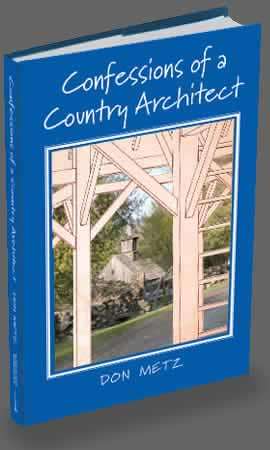Don Metz maintains a small, selective practice in Lyme, NH, concentrating on challenging residential projects
Don Metz's new book
"Confessions of a Country Architect"
is now available

Don Metz's Confessions describes the life of a residential country architect with wry humor and pathos. This book will delight all those who have built a house, forearm those summoning up the courage to do so, and calm those who realize their talents might be better confined to an armchair with a view. Readers will be seduced by the author's adventures as he confronts the awkward, intractable, and hilariously messy job of building dreams.
Order from the publisher or Amazon now.
King of the Mountain

High among the crags of Crooked Mountain in northern Vermont, a sacred Indian site overlooks the village of Dalton Pond. Although the mountain has been protected for generations within the boundaries of Snoot and Frouncy Audette’s battered farm, everything changes when their son, Junior, comes back from Vietnam permanently maimed, embittered, and alienated from his parents and his beautiful, half-Abenaki wife, Clair. Secretly, Junior sells the farm to a local developer.
The battle for the land and its unique heritage begins when Walker Owen is summoned northward by his old friend, the outlaw farmer/giant/logger and all-around rascal, Snoot. Walker is Clair’s former lover (and much on her mind lately, despite his ten-year absence). Now a restless “flatlander” lawyer, Walker is eager to pitch in and win back whatever he can—despite Junior. But his legal skills are set aside when Clair’s mysterious Abenaki father, Horton Eagle-in-the-Wind, sets in motion an unconditional and final standard of magical justice.
Don Metz’s new novel is stunning proof that his brilliant first novel, Catamount Bridge, was no accident. Peopled with unforgettable New England characters and bristling with a northwoods language all its own, King of the Mountain is a dramatic tale of love and redemption, of “Native” versus “Flatlander” that examines how people behave when their land is threatened, when uninvited change occurs. From the rapacious developers’ disposal mindset, to Snoot’s stubborn Yankee practicality, to Walker’s struggle to rediscover himself in the only place he’s ever wanted to call home, to the Abenaki’s principle of gentle custodianship—territorial rights and passions flare, and the resulting fireworks will delight readers from Maine to California.
"Don Metz knows the bittersweet beauty of the New England hills, and he peoples them in his fiction with characters who are justas proud, just as enduring. King of the Mountain is a beautifully written novel –– a testimonial to Metz's powers of empathy and
his bold lyric style"
––W. D. Wethherell, author of The Man Who Loved Levittown
and Chekov's Sister
“King of the Mountain establishes Don Metz as one the best story-tellers we have. He doesn’t let the reader down for a minute.”
—Richard Selzer
“King of the Mountain is as gritty and inevitable as Metz’s first book, but it’s richer in characters, modulated by a lyric appreciation of nature and its effects on human sensibility, and his story-line builds inexorably to a rousing finish! Long live Snoot and Founcy, and Walker and Clair, and even Bud and Junior—and may the spirit of Horton Flint, last of the Abenaki, walk with us all!”
—Gordon Weaver, author of A World Quite Round and Circling Byzantium
“With the keenest eye of any contemporary mythologist of upcountry New England, Don Metz provides the fullest picture to date of this complex zone. With its humor and stylistic grace (who but Metz could write so lyrically, say, about blasting ledge?), King of the Mountain is splendid.
—Sydney Lea, author of A Place of Mind
“On Don Metz’s mountain you get a story of yarn-like reach, hearty and heartfelt, rip-roaring and high-minded; a natural universe you can downright smell; and characters with a capital C, folks as messy-mannered and wonderful and inside-out as are the common kings we ourselves now then are.”
—Lee K. Abbott, author of Strangers in Paradise


